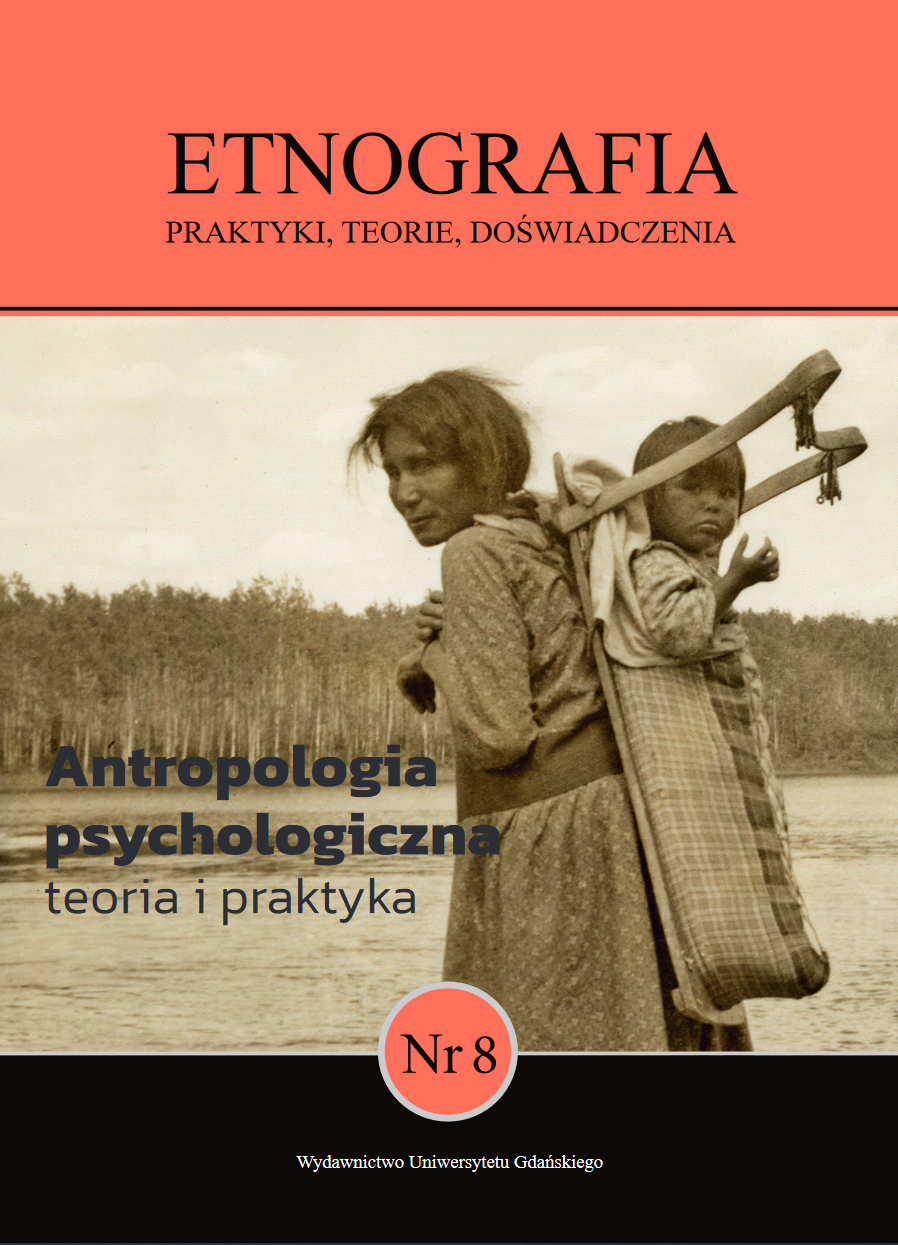Potknięcie. Etnograficznie o psychiatryzacji dzieci i młodzieży w kontekście adopcji zamkniętej w Polsce
DOI:
https://doi.org/10.26881/etno.2022.8.05Słowa kluczowe:
adoption, psychiatrization, childhood, mental health, youthAbstrakt
In the text, I look at the processes of psychiatrization as they unfold within social policies implemented in Poland. The presented ethnographic description focuses on the institution of adoption. I am telling the story of a young girl adopted as an infant. By creating an ethnographic commentary on the story, I raise the issues of epistemic inequalities, diagnostic cultures, biological reductionism and biopolitical bureaucracy. Methodologically, my analysis is based on in-depth interviews with the adoptive parents, the adopted girl and the people taking care of her at the youth educational centre, as well as numerous diagnostic documents developed by experts co-creating the system of social care in Poland.
Downloads
Bibliografia
Akua Mensah, S., Kaufman-Mthimkhulu, S. (2020). Abolition must include psychiatry. Disa- bility Visibility Project. https://disabilityvisibilityproject.com/2020/07/22/abolition- must-include-psychiatry/amp/?__twitter_impression=true&fbclid=IwAR1ND QqmU9hOtZK NvYsA0o2tqtqwEg3Y4UH5RnVwRTEcOCk54CkRukQAfPk [dostęp: 26.08.2020].
Bech Risør, M., Nissen, N. (2018). Configurations of diagnostic processes and practices: An introduction. W: N. Nissen, M. Bech Risør (eds.), Diagnostic fluidity. Working with uncertainty and mutability (s. 11–32). Tarragona: Publications URV.
Beeker, T., Witeska-Młynarczyk, A., Meerman, S., Mills, C. (2020). Psychiatrization of, with and by children: Drawing a complex picture. Global Studies of Childhood, 10(1), 12–25.
Béhague, D. (2008). The domains of psychiatric practice: From centre to periphery. Cultural Medical Psychiatry, 32(2), 140–151.
Biehl, J., McKay, R. (2012). Ethnography as a political critique. Anthropological Quarterly, 85(4), 1209–1228.
Biehl, J., Moran-Thomas, A. (2009). Symptom: Subjectivities, social ills, technologies. Annual Review of Anthropology, 38, 267–288.
Blum, L. (2015). Raising Generation Rx: Mothering kids with invisible disabilities in an age of inequality. New York: New York University Press.
Boon, S. (2018). Belongings: Stumble. W: S. Boon, L. Butler, D. Jefferies (eds.), Autoethno- graphy and eminist theory at the water’s edge: Unsettled islands (s. 135–137). Cham: Palgrave McMillan.
Breggin, P. (2014). The rights of children and parents in regard to children receiving psy- chiatric diagnoses and drugs. Children and Society, 28, 231–241.
Brunila, K., Lundahl, L. (eds.). (2020). Youth on the move: Tendencies and tensions in youth policies and practices. Helsinki: Helsinki University Press.
Carsten, J. (2004). After kinship. Cambridge: Cambridge University Press.
Coppock, V. (2020). Psychiatrised childhoods. Global Studies of Childhood, 10, 3–11. Davies, B. (2005). The (im)possibility of intellectual work in neoliberal regimes. Discourse: Studies in the Cultural Politics of Education, 26(1), 1–14.
Ellis, E., Bochner, A. (2016). Evocative autoethnography: Writing lives and telling stories. New York: Routledge.
Foucault, M. (2011). Narodziny biopolityki. Przeł. M. Herer. Warszawa: Wydawnictwo Naukowe PWN.
Gessen, M. (2020, 9 lutego). Judith Butler wants us to reshape our rage. The New Yorker.
https://www.newyorker.com/culture/the-new-yorker-interview/judith-butler- wants-us-to-reshape-our-rage?mbid=social_facebook&utm_source=facebook& utm_brand=tny&utm_social-type=owned&utm_medium=social&fbclid=IwA- R1zUj7ctFLJu42lHmtwgHP8i-ioX84GqBiqmrKTHUlZ6Bm_nNhxc7b263E [dostęp: 28.08.2020].
Golightley, S. (2020). Troubling the “troubled teen” industry: Adult reflections on youth experiences of therapeutic boarding schools. Global Studies of Childhood, 10, 53–63.
Harwood, V. (2006). Diagnosing “disorderly” children: A critique of behaviour disorder discourses. London: Routledge.
Howell, S. (2006). The kinning of foreigners: Transnational adoption in a global perspective. New York: Berghahn Books.
Jenkins, J. (2015). Extraordinary conditions: Culture and experience in mental illness. Oakland: University of California Press.
Kacperczyk, A. (2014). Autoetnografia – technika, metoda, nowy paradygmat? O metodo- logicznym statusie autoetnografii. Przegląd Socjologii Jakościowej, 10(3), 32–74.
Keane, W. (2016). Ethical life: Its natural and social histories. Princeton: Princeton University Press.
Keane, W. (2018). Perspectives on affordances, or the anthropological real: The 2018 Daryll Forde Lecture. HAU: Journal of Ethnographic Theory, 8(1/2), 27–38.
LeFrançois, B. (2020). Psychiatrizing children. W: V. Cooper, N. Holford (eds.), Exploring childhood and youth (s. 177–190). London: Tylor & Francis.
LeFrançois, B., Menzies, R., Reaume, G. (eds.). (2013). Mad matters: A critical reader in Canadian mad studies. Toronto: Canadian Scholars Press.
Leinaweaver, J. (2018). Adoption (s. 1–16). W: F. Stein, S. Lazar, M. Candea, H. Diemberger, J. Robbins, A. Sanchez, R. Stasch (eds.), The Cambridge encyclopedia of anthropology. http://doi.org/10.29164/18adopt.
Liegghio, M. (2020). Allyship and solidarity, not therapy, in child and youth mental health: Lessons from a participatory action research project with psychiatrized youth. Global Studies of Childhood, 10(1), 78–89.
Logan, J., Karter, J. (2022). Psychiatrization of resistance: The co-option of consumer, survi- vor, and ex-patient movements in the Global South. Frontiers in Sociology. https://doi. org/10.3389/fsoc.2022.784390.
Mills, C. (2013). Decolonizing global mental health: The psychiatrization of the majority of the world. London: Routledge.
Ochs, E., Kremer-Sadlik, T. (2007). Introduction: Morality as family practice. Discourse and Society, 18(1), 5–10.
Rynkiewicz, J., Michalik, G., Wodziński, M. (2020). Wytrzymałość i skromność. Rozmowa z Thomasem Fuchsem. Psychiatra, 28(1). http://www.psychiatraonline.pl/kwartal- nik/?p=322 [dostęp: 28.08.2020].
Schier, K. (2018). Formy pomocy niewidzialnym dzieciom, czyli tym, które doświadczyły odwrócenia ról w rodzinie. Dziecko Krzywdzone. Teoria, badania, praktyka, 17(4), 28–50.
Schier, K. (red.). (2020). Samotne ciało. Doświadczanie cielesności przez dzieci i ich rodziców. Warszawa: Wydawnictwo Naukowe Scholar.
Skiepko, M., Brągoszewska, J. (2009). Zaburzenia psychiczne u dzieci adoptowanych. Psychiatria i Psychologia Kliniczna, 9(3), 207–213.
Weston, K. (1991). Families we choose: Lesbians, gays, kinship. New York: Columbia University Press.
Witeska-Młynarczyk, A. (red.). (2018). Antropologia psychiatrii dzieci i młodzieży. Wybór tekstów. Warszawa: Oficyna Naukowa.
Witeska-Młynarczyk, A. (2019). Dziecięce doświadczenia ADHD. Etnografia spornej jednostki diagnostycznej. Warszawa: Oficyna Naukowa.
Witeska-Młynarczyk, A. (2020). Can the children speak? Voice, children and an ADHD diagnosis in an ethnographic research. Revue des Sciences Sociales, 63, 46–57.
Witeska-Młynarczyk, A. (2022a). Psychiatrization of adoption practices in contemporary Poland. Frontiers in Sociology. https://doi.org/10.3389/fsoc.2022.869593.
Witeska-Młynarczyk, A. (2022b). Kiedy doświadczenie opieki staje się opowieścią. W: Witeska-Młynarczyk, A., Maciejewska-Mroczek, E., Krawczak, A. (red.), Dzieci z niemiejsc. Kiedy doświadczenie staje się opowieścią (s. 7–30). Warszawa: Oficyna Naukowa.
Wyatt, J., Adams, T. (eds.). (2014). On (writing) families: Autoehtnographies of presence and absence, love and loss. Rotterdam: Sense.
Opublikowane
Jak cytować
Numer
Dział
Licencja
Czasopismo wydawane jest na licencji Creative Commons Uznanie autorstwa-Na tych samych warunkach 4.0 Międzynarodowe.

 Uniwersyteckie Czasopisma Naukowe
Uniwersyteckie Czasopisma Naukowe








